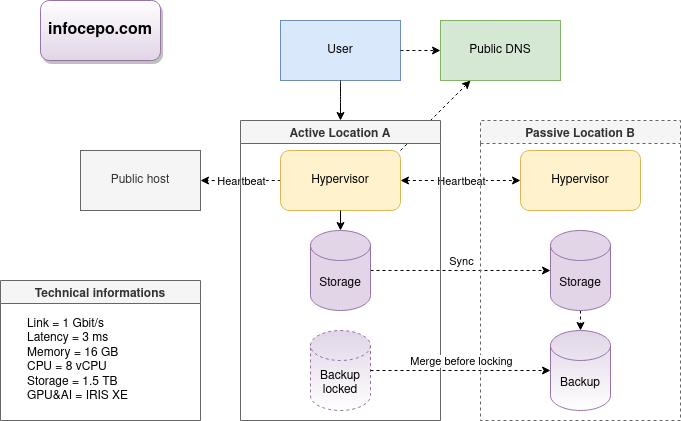LAB project
Jump to navigation
Jump to search
Resilient, low power and encrypted LAB CLOUD project.
Diagram
Data security
- Availability is via LAB project#HA & RSYNC & another location & another internet provider & public DNS
- Integrity is provided by BTRFS and will be provided by MINIO for large static files
- Theft protection is provided by AC and FDE encryption
- Loss protection is performed via AC & RSYNC & BTRFS and locks/unlocks FDE drives
- Scalability will be via the CEPH
My LAB tools
- MEDIAWIKI (sharing editor)
- DEBIAN
- app.diagrams.net (diagram editors)
- x86 CPU (for ARM I will use QEMU emulator)
- OPENCL GPU (AI&SIGNAL processing)
- LXD/SNAP/MICROK8S (virtualization&container)
- LSOF (system&network audit)
- NMAP (Network scanner)
- TCPDUMP (Network monitoring)
Tested in this LAB
- NEXTCLOUD nextcloud.infocepo.com (aFM8yKYmDa)
- MEDIAWIKI infocepo.com
- KUBERNETES Cluster wiki.infocepo.com (demo available, ask me)
- MARIADB GALERA Cluster
- OPENSTACK
- PROMETHEUS prometheus.infocepo.com (demo available, ask me)
- YACY google.infocepo.com (decentralized search engine) (demo available, ask me)
- GLUSTERFS
- KATA (container runtime like a VM)
- AWS CLI
- ANSIBLE
- GIT
HA
I love COROSYNC/PACEMAKER, but for this LAB I wanted something from scratch:
#!/bin/bash
#ynotopec at gmail.com
domainName=$(cat domainName)
portNumber=$(cat portNumber)
publicHost1=$(cat publicHost1)
publicHost2=$(cat publicHost2)
echo "$(date): init"
#Clean
stop${domainName}.sh
#If I was the master sleep a little !
ipPublic="$(dig +short myip.opendns.com @resolver1.opendns.com )"
ipMasterOld="$(nslookup ${domainName} |sed -rn 's#^Address: (.*)$#\1#p' )"
[ "${ipPublic}" = "${ipMasterOld}" ] &&sleep 240
#Wait Internet
while (! ping -w2 -c1 ${publicHost1} >/dev/null 2>&1 );do
sleep 10
done
#Wait Admin Unlock Backup
waitAdminUnLockBCK.sh
#If passif merge backup
if (nc -zw2 ${domainName} 443 >/dev/null 2>&1 ||(sleep 10 ;nc -zw4 ${domainName} 443 >/dev/null 2>&1 ) ) ;then
rsync --max-size=4M --ignore-existing --numeric-ids --modify-window=1 --ignore-errors --block-size=128.00K --inplace --no-whole-file \
-z --compress-level=9 \
-aAXxv \
--exclude=.rsync_* \
--rsh="ssh -i ~/.ssh/storage@${domainName}.key -p ${portNumer} -oStrictHostKeyChecking=no" \
${domainName}:/storage/rsync-rollback/ /storage/rsync-rollback/
fi
#lock bck source after merge
lockBckSource.sh
#Wait master down (big loop)
while (nc -zw2 ${domainName} ${portNumber} >/dev/null 2>&1 ||(sleep 10 ;nc -zw4 ${domainName} ${portNumber} >/dev/null 2>&1 ) );do
if [ -z "$(find ha_synced -type f -mmin -60 2>/dev/null )" ] ;then
rsync --numeric-ids --delete --force --modify-window=1 --ignore-errors --block-size=128.00K --inplace --no-whole-file \
-z --compress-level=9 \
-aAXxv \
--backup-dir=rsync-rollback/$(date '+%Y-%m-%d') \
--exclude=rsync-rollback \
--exclude=.rsync_* \
--rsh="ssh -i ~/.ssh/storage@${domainName}.key -p ${portNumer} -oStrictHostKeyChecking=no" \
${domainName}:/storage/ /storage/ &&touch ha_synced
fi
sleep 10
done
#Maybe it's me down ! If INTERNET down, reboot
! ping -w2 -c1 ${publicHost1} >/dev/null 2>&1 &&reboot
#Become master
#lock Backup (integrity protection against attacks)
lockBCK.sh
#Register DNS
ipMasterDown="$(nslookup ${domainName} |sed -rn 's#^Address: (.*)$#\1#p' )"
updateDns.sh "${ipPublic}"
#Random startup time
sleep $((RANDOM%10))
${domainName}Start.sh &
#Wait DNS propagation
sleep $((240-25))
#Monitor
echo "$(date): up"
[ "${ipPublic}" = "${ipMasterDown}" ] &&ipMasterDown=""
while [ "${ipPublic}" = "$(nslookup ${domainName} |sed -rn 's#^Address: (.*)$#\1#p' )" ] \
&&( ! nc -zw2 "${ipMasterDown}" 443 >/dev/null 2>&1 ) \
&&(nc -zw2 "${ipPublic}" 443 >/dev/null 2>&1 ||nc -zw4 "${ipPublic}" 443 >/dev/null 2>&1 ) \
&&(nc -zw2 "${ipMasterDown}" ${portNumer} >/dev/null 2>&1 ||ping -w2 -c1 ${publicHost1} >/dev/null 2>&1 ||ping -w2 -c1 ${publicHost2} >/dev/null 2>&1 ) ;do
sleep 4
done
echo "$(date): down"
#Stop
stop${domainName}.sh
reboot
Optimizations explained
To reduce Network data I added options to rsync:
- only send modified data blocks from files
--inplace --block-size=128.00K
- compress transfer
-z --compress-level=9
To increase flash storage life:
--inplace --no-whole-file
Cost per month
800€*2=1600€ :hypervisors (popular CPU X86 notebook, 8GB+) -400€*2=-800€ :sale after one year 800€/12m=33€ :price/month 30*2=60€ :Internet (~1PB outbound/month) (7.5W+7.5W)*24h*30.5d/1000Wh*.15€*2~=3.3€ :electricity 33+60+3.3~=96€ :cost/month
Futur
- Migrate rsync to real time replication.
- Add MINIO for objects storage and streaming.
- Improve synchronization algorithm (bisync.sh):
- The NEXTCLOUD algorithm is very good average, but is very poor for dynamic big files like DB or virtual images.
- OSYNC is slow, and I don't know for big files.
- RSYNC is very good average but not dealing with inodes (moving files).
- Alert passive location locked and add de-lock page.
- Double storage to have active/active locations. Storage 1 location A to B. Storage 2 location B to A.
